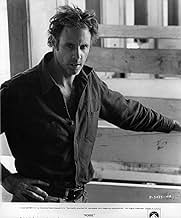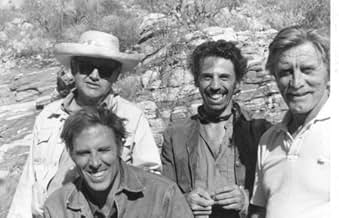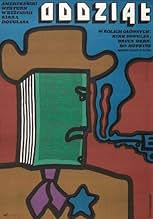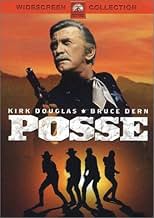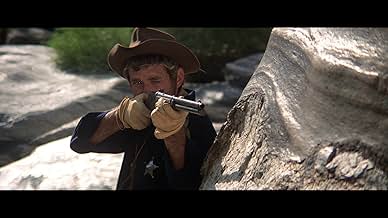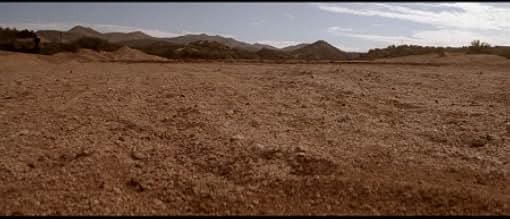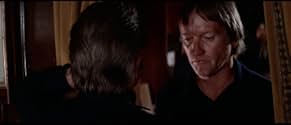VALUTAZIONE IMDb
6,5/10
2638
LA TUA VALUTAZIONE
Un maresciallo politico senza scrupoli e i suoi vice inseguono una banda di rapinatori di treni il cui leader dimostra che ogni uomo ha il suo prezzo.Un maresciallo politico senza scrupoli e i suoi vice inseguono una banda di rapinatori di treni il cui leader dimostra che ogni uomo ha il suo prezzo.Un maresciallo politico senza scrupoli e i suoi vice inseguono una banda di rapinatori di treni il cui leader dimostra che ogni uomo ha il suo prezzo.
- Regia
- Sceneggiatura
- Star
- Premi
- 1 candidatura in totale
William H. Burton
- McCanless
- (as Bill Burton)
Recensioni in evidenza
One thing about Kirk Douglas is that he's never been afraid to let the public see him as a bad guy. It's a great tribute to his ability as an actor to develop such a wide range of characters from the heroic Spartacus to the villainous George Brougham in The List of Adrian Messenger.
Posse falls somewhere in the middle of those two films in terms of the good versus evil scale for Kirk Douglas. Politicians running on "law and order" platforms were just coming into vogue at the time and this western is spot on about those kind of politicians and the motivations behind them.
Kirk Douglas is a U.S. Marshal with political ambitions to be a United States Senator. He's got his photographer with him to record his exploits and travels on a private railroad car provided by the railroad.
He's on the trail of outlaw Jack Strawhorn, played by Bruce Dern. Before capturing Strawhorn, Douglas and his posse burn alive Dern's gang in a barn fire and then butcher another group of misfits he's put together even as they want to surrender.
What I like most about Posse is that it doesn't try to make Dern out any kind of a hero. He's an outlaw the way some people are grocers, bakers, shoemakers, etc. This may very well have been Bruce Dern's best screen role.
It turns out that Dern is a far better judge of human nature than the fatuous Douglas is. The town of Tesota, Texas where most of the action takes place is very much sadder and wiser when the film concludes.
A lot of the same themes are covered in the more acclaimed The Unforgiven with Clint Eastwood who also starred and directed himself. But I think Kirk Douglas got there first.
Posse falls somewhere in the middle of those two films in terms of the good versus evil scale for Kirk Douglas. Politicians running on "law and order" platforms were just coming into vogue at the time and this western is spot on about those kind of politicians and the motivations behind them.
Kirk Douglas is a U.S. Marshal with political ambitions to be a United States Senator. He's got his photographer with him to record his exploits and travels on a private railroad car provided by the railroad.
He's on the trail of outlaw Jack Strawhorn, played by Bruce Dern. Before capturing Strawhorn, Douglas and his posse burn alive Dern's gang in a barn fire and then butcher another group of misfits he's put together even as they want to surrender.
What I like most about Posse is that it doesn't try to make Dern out any kind of a hero. He's an outlaw the way some people are grocers, bakers, shoemakers, etc. This may very well have been Bruce Dern's best screen role.
It turns out that Dern is a far better judge of human nature than the fatuous Douglas is. The town of Tesota, Texas where most of the action takes place is very much sadder and wiser when the film concludes.
A lot of the same themes are covered in the more acclaimed The Unforgiven with Clint Eastwood who also starred and directed himself. But I think Kirk Douglas got there first.
Kirk Douglas had already directed the somewhat terrible Scalawag in 1973, but that previous flop did not deter him from having a second stab at the directing job a couple of years on. Fortunately, Posse is a much more accomplished film than Scalawag in every way: Douglas's own direction is more assured, the script by Christopher Knopf and William Roberts is very literate and clever, and Fred Koenekamp's cinematography has a good, professional look about it. By 1975, one would have thought that there would be little mileage left in the western genre. It seemed that nothing new could be done, but this one comes up with a fresh twist by having the "hero" gradually revealed as an unlikable and ambitious social climber.
Marshal Howard Nightingale (Douglas) publicly announces that he will bring in infamous railroad bandit Jack Strawhorn (Bruce Dern). Although Strawhorn is a criminal of considerable notoriety - and definitely a man who belongs behind bars - Nightingale has an ulterior motive for apprehending his man. For the good Marshal has decided to run for the Texan senate, and believes that if he can nail Strawhorn - painting himself as a hero into the bargain - he will win over plenty of voters. Gradually, more and more people begin to see through Nightingale's selfish and egotistical political plans. His own posse have their doubts about how they will figure in the Marshal's future schemes; a news editor named Hellman (James Stacy) expresses distrust over the Marshal's ludicrously self-important opinion of himself; even Strawhorn eventually realises what his sly adversary is up to. Ultimately, Nightingale loses his posse and his public favour, with a little clever intervention from Strawhorn, and sees his political dreams left in tatters.
The critical response to Posse was much more favourable than Douglas's previous directing attempt, and deservedly so. The western action in the film is good, solid stuff, not too violent (as was the trend in '75), but certainly tough enough to satisfy genre addicts. Douglas gives a strong performance as the absurdly self-obsessed marshal, and Dern is even better as the charismatic, even likable, bandit. The subversive nature of the plot (hero gradually turns out to be villain, villain gradually turns out to be hero) is intriguing and fairly fresh, and helps to add interest to the film. While Posse has occasional lulls, and a few noticeably amateurish performances lower down the cast list, it remains a fresh, interesting, and intriguing addition to a virtually exhausted genre.
Marshal Howard Nightingale (Douglas) publicly announces that he will bring in infamous railroad bandit Jack Strawhorn (Bruce Dern). Although Strawhorn is a criminal of considerable notoriety - and definitely a man who belongs behind bars - Nightingale has an ulterior motive for apprehending his man. For the good Marshal has decided to run for the Texan senate, and believes that if he can nail Strawhorn - painting himself as a hero into the bargain - he will win over plenty of voters. Gradually, more and more people begin to see through Nightingale's selfish and egotistical political plans. His own posse have their doubts about how they will figure in the Marshal's future schemes; a news editor named Hellman (James Stacy) expresses distrust over the Marshal's ludicrously self-important opinion of himself; even Strawhorn eventually realises what his sly adversary is up to. Ultimately, Nightingale loses his posse and his public favour, with a little clever intervention from Strawhorn, and sees his political dreams left in tatters.
The critical response to Posse was much more favourable than Douglas's previous directing attempt, and deservedly so. The western action in the film is good, solid stuff, not too violent (as was the trend in '75), but certainly tough enough to satisfy genre addicts. Douglas gives a strong performance as the absurdly self-obsessed marshal, and Dern is even better as the charismatic, even likable, bandit. The subversive nature of the plot (hero gradually turns out to be villain, villain gradually turns out to be hero) is intriguing and fairly fresh, and helps to add interest to the film. While Posse has occasional lulls, and a few noticeably amateurish performances lower down the cast list, it remains a fresh, interesting, and intriguing addition to a virtually exhausted genre.
The outlaw Jack Strawhorn (Bruce Dern) is betrayed by one of his men, Pensteman (David Canary), after robbing US$ 40,000.00 from a train. During the night, his gang is ambushed in a barn by Marshal Howard Nightingale (Kirk Douglas) and his posse that set fire on the place, burning the criminals and the money, but Strawhorn escapes from the attack. He heads to Tesota, Texas, where he kills Pensteman and the local sheriff. Meanwhile, the ambitious Marshal Nightingale that is running for the senate is traveling by train with his posse to Tesota, expecting to capture Strawhorn to help him to win the elections. Nightingale succeeds in his manhunt and poses of hero, but while Strawhorn is in the jail, he poisons the posse asking what will happen with them after the election of their boss. During the transportation of Strawhorn for judgment by train, the outlaw reverts the situation and captures Nightingale. Now he demands the same amount he lost in the fire to release Nightingale and the posse force the locals to give the money to rescue the marshal.
"Posse" is a western with a cynical and amoral tale of leadership, disloyalty and greedy. The twist in the very end is totally unexpected and all the characters are despicable and disloyal with no exception. Marshal Howard Nightingale is probably the worst, with all the characteristics that politicians usually have. James Stacy lost his left arm and left leg when he was riding a motorcycle with his girlfriend and they were struck by a drunk driver that also killed his girlfriend. My vote is seven.
Title (Brazil): "Ambição Acima da Lei" ("Ambition above the Law")
"Posse" is a western with a cynical and amoral tale of leadership, disloyalty and greedy. The twist in the very end is totally unexpected and all the characters are despicable and disloyal with no exception. Marshal Howard Nightingale is probably the worst, with all the characteristics that politicians usually have. James Stacy lost his left arm and left leg when he was riding a motorcycle with his girlfriend and they were struck by a drunk driver that also killed his girlfriend. My vote is seven.
Title (Brazil): "Ambição Acima da Lei" ("Ambition above the Law")
Well, not 'the best', perhaps, but an interesting and stylish western starring Kirk Douglas, who also produced and directed it. Bruce Dern is great as Strawhorn, the bad guy who ends up stealing the show.
Howard Nightingale is running for a seat in the US Senate. He is a man of great complexity, and one trait very much to the fore in his personality is a ruthless desire to impress the voters. He has assembled a posse of rangers, his own personal uniformed army of crimebusters. Nightingale (played by Douglas) has calculated that he can win the election on a clear-the-territory-of-lowlifes ticket. He and his posse are hunting down Strawhorn, and have fitted out a crusade train for the purpose of capturing their prey. The plan is to grab Strawhorn and hang him just in time for the election.
Nightingale is in the pocket of the railroad owners. The local newspaper is the Tesota Sentinel, and one of the film's themes is the valuable role played by the press in speaking truth to those in power. One-armed, one-legged journalist Harold Hellman (played by James Stacy, who had recently lost both limbs on a motor cycle accident) is the equal of the photogenic wannabe Senator. Nightingale works the crowd with glib words, but his position is being eroded by a different formula of words - that used by The Sentinel.
One of the film's elegant touches is the photography motif. At various points in the story, the participants pose to have their picture taken, and the resulting stills form a freeze-frame chronicle of the action. A lot of post-production work went into dubbing extraneous voices onto the soundtrack, so that the crowd scenes are laced with apposite little remarks.
A violently-burning train provides terrific visuals, as well as offering acerbic comment on Nightingale's political aspirations. The film's concluding message, that by its nature a standing army is a threat to democracy, is well made - as is the point about the fickleness of public opinion.
Verdict - A clever, enjoyable little western.
Howard Nightingale is running for a seat in the US Senate. He is a man of great complexity, and one trait very much to the fore in his personality is a ruthless desire to impress the voters. He has assembled a posse of rangers, his own personal uniformed army of crimebusters. Nightingale (played by Douglas) has calculated that he can win the election on a clear-the-territory-of-lowlifes ticket. He and his posse are hunting down Strawhorn, and have fitted out a crusade train for the purpose of capturing their prey. The plan is to grab Strawhorn and hang him just in time for the election.
Nightingale is in the pocket of the railroad owners. The local newspaper is the Tesota Sentinel, and one of the film's themes is the valuable role played by the press in speaking truth to those in power. One-armed, one-legged journalist Harold Hellman (played by James Stacy, who had recently lost both limbs on a motor cycle accident) is the equal of the photogenic wannabe Senator. Nightingale works the crowd with glib words, but his position is being eroded by a different formula of words - that used by The Sentinel.
One of the film's elegant touches is the photography motif. At various points in the story, the participants pose to have their picture taken, and the resulting stills form a freeze-frame chronicle of the action. A lot of post-production work went into dubbing extraneous voices onto the soundtrack, so that the crowd scenes are laced with apposite little remarks.
A violently-burning train provides terrific visuals, as well as offering acerbic comment on Nightingale's political aspirations. The film's concluding message, that by its nature a standing army is a threat to democracy, is well made - as is the point about the fickleness of public opinion.
Verdict - A clever, enjoyable little western.
Not a bad western, but not a real winner either. Most of the acting was good, but some of the performers need to go back to drama class and bone up a bit. Douglas and Dern kept the show going with their give and take, although I don't think the real lawmen and desperados actually carried on in this fashion. I think Strawhorn was more of a realist than a truly bad person; he saw the reality of life and became practical because of his vision. Dealing with 2 faced con men like Nightingale merely solidified his outlook on life.
Lo sapevi?
- QuizThis movie was the first role for James Stacy following his 1973 motorcycle accident in which he was hit by a drunk driver, resulting in the loss of his left arm and left leg. Kirk Douglas created the role especially for Stacy.
- BlooperUS Senators were not directly elected at the time of the film's setting. They were appointed by State Legislatures until the 17th Amendment in 1913.
- Citazioni
Jack Strawhorn: Every day above ground is a good day.
- ConnessioniReferenced in Talking Pictures: Allan Warnick, Supporting Actor in 'Chinatown' (2022)
- Colonne sonoreI've Been Working on the Railroad
(uncredited)
Traditional
The first line is sung during Nightingale's speech
I più visti
Accedi per valutare e creare un elenco di titoli salvati per ottenere consigli personalizzati
- How long is Posse?Powered by Alexa
Dettagli
Botteghino
- Budget
- 2.000.000 USD (previsto)
Contribuisci a questa pagina
Suggerisci una modifica o aggiungi i contenuti mancanti

Divario superiore
By what name was I giustizieri del West (1975) officially released in India in English?
Rispondi

